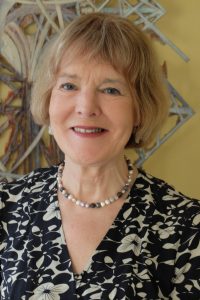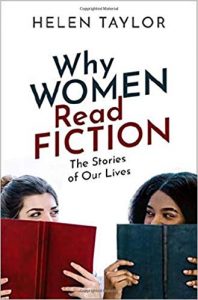Why Women Read Fiction
Why Women Read Fiction: The Stories of Our Lives
By Helen Taylor
Copyright
 Over several decades, I’ve been fascinated by the importance women attach to reading fiction, and how eager they are to discuss it. In the 1980s, I began to research a scholarly book about that classic bestseller Gone With the Wind, and was astonished how many women (hardly any men) wanted to tell me their personal stories about the love, passion and sadness involved in reading the book and seeing the film.
Over several decades, I’ve been fascinated by the importance women attach to reading fiction, and how eager they are to discuss it. In the 1980s, I began to research a scholarly book about that classic bestseller Gone With the Wind, and was astonished how many women (hardly any men) wanted to tell me their personal stories about the love, passion and sadness involved in reading the book and seeing the film.
I corresponded (by snail mail) with dozens of women who told me how important fiction reading was to them, and how certain novels – usually by women writers, like Margaret Mitchell – had shaped their lives.
My book, Scarlett’s Women: Gone With the Wind and its Female Fans, reflected many of these feelings. And as a university English teacher, I was always fascinated by the variety of (usually female) student responses to novels, and the ways they took idiosyncratic routes into story, character and literary style. For many years I have wanted to answer the question, what does fiction reading mean to women? The result is my new book, Why Women Read Fiction: The Stories of Our Lives.
Ian McEwan once said, ‘When women stop reading, the novel will be dead.’ A few years ago I began to explore why that is, and the more I researched, the more startling were my findings. Here are a few statistics. Women account for roughly two-thirds of sales in the UK (higher if you include the US and Canada).
In all categories of fiction, apart from fantasy, science fiction and horror, women purchasers outnumber men: 63% to 37% for books and e-books. Women purchase three quarters of general and erotic fiction, but roughly nine out of ten romance, saga and Mills and Boon novels.
Talking to and corresponding (now by email) with over 500 female readers and writers, I learned how precious fiction is to contemporary British women readers, and how they draw on it to define and give meaning to the stories of their/our lives. For so many, reading is a crucial, magical and life-saving activity that takes them more or less from cradle to grave.
Female readers are key to the future of fiction and – as parents, teachers and librarians – I see us as the glue for a literate society. We think of reading as a solitary act – there are thousands of paintings and photos of women sitting head bowed in a room all on their own. However, much as women treasure the chance to read alone, we also regularly share reading experiences and memories with mothers, daughters, grandchildren, female friends and mothers at the school gate.
For so many, reading fiction enables us to escape and to spread their wings intellectually and emotionally. As Emily Dickinson said, ‘There is no Frigate like a book/To take us lands away’.
Readers described their fiction reading as ‘the love of my life’ and ‘my best friend,’ with one woman saying it was ‘fractionally less important than breathing, but only just!’ Stephen King said he wrote novels for his mother who called them ‘cheap sweet vacations,’ and many women compare their novel reading to the wicked act of eating sweets and desserts.
In my book, I explain where and when they read fiction (guiltily in the morning or comfortably at bedtime), in special places and at quiet times like hospital stays and spells of chemotherapy, and how stories and writers influence individual lives.
It’s amazing how little media attention is paid to the fact that women are the main buyers and readers of fiction, members of book clubs, attendees at literary festivals, and organisers of days out to fictional sites and writers’ homes.
We have been enthusiasts for, and thus helped shape the genres of, romance, erotica and crime, and we are largely responsible for the global passion for and many versions and appropriations of two favourite novels, Pride and Prejudice and Jane Eyre – both of which spell out how important reading well and closely is for women.
Many women told me how proud they are of the rows of Virago Modern Classics on their bookshelves, and how important women’s fiction is to them. Female novelists recognise and are humbly grateful for that – though suspicious of the label ‘woman writer’. Hilary Mantel told me she hates being ‘Little Womaned’.
Critics and broadcasters talk of ‘readers’ as if they are an homogeneous body, who read just as writers intended. However, what emerged from my research is just how varied, anarchic and individual readers’ experiences are. Assumptions are made that we’ve all read the great classics – and many women feel shame at the gaps in their reading histories, often pretending to have read ‘significant’ texts. There’s no guarantee a reader will read a whole book (they may get bored, skip, select, dump after fifty pages).
They may find a novel chimes with their life story or irritates them because it doesn’t seem true to their experience. It may provoke wonderful or painful memories or – best of all – put into words feelings they haven’t been able to express.
However, despite our differences, there’s a clear picture of women taking fiction reading extremely seriously and committing their money, time and energy to the novel. We read fiction by both genders, while men overwhelmingly read fiction by men (and a lot less of it).
Women are far happier than men to ask advice from (usually female) librarians and booksellers, and of course join book clubs and attend literary readings and festivals.
Although we absorb newspaper, broadcasting and online reviews, we rely on our female family members, friends and book club buddies for new ideas and books we’d never have dreamed of reading. And we produce reading group spreadsheets, organise visits to festivals and literary heritage sites, and keep notebooks listing and writing detailed comments on titles read. As publishers and pundits complain about the decline of reading, this deserves celebration!
Guy Pringle described book clubs as ‘the female equivalent of freemasonry,’ which seems an apt description of all female readership that is shared under the radar. For women care deeply about fiction that allows us to explore worlds and people beyond our own, learn about historical periods through character and a sense of place, and help us construct and evaluate our own life stories by active engagement with character and narrative. In writer Jackie Kay’s words, ‘our lives are mapped by books.’
—
Helen Taylor is Emeritus Professor of English, University of Exeter, an Honorary Fellow of the British Association of American Studies, and Leverhulme Emeritus Fellow. She has taught at the Universities of Bristol, West of England, Warwick and Exeter, where she was Head of the School of English. She is an expert in the literature and culture of the American South, as well as women’s writing. Previous books include Scarlett’s Women: Gone With the Wind and its Female Fans; Circling Dixie: Contemporary Southern Culture through a Transatlantic Lens; and The Daphne du Maurier Companion.
She has curated, chaired at and directed many literature festivals, and was the first Director of Liverpool Literary Festival. She lives in Bristol.
WHY WOMEN READ FICTION The Stories Of Our Lives (Oxford University Press)
“Lively and absorbing, like a conversation with other women you wish you knew.” – Hilary Mantel
 Ian McEwan once said, ‘When women stop reading, the novel will be dead.’ This book explains how precious fiction is to contemporary women readers, and how they draw on it to tell the stories of their lives. Female readers are key to the future of fiction and–as parents, teachers, and librarians–the glue for a literate society. Women treasure the chance to read alone, but have also gregariously shared reading experiences and memories with mothers, daughters, grandchildren, and female friends. For so many, reading novels and short stories enables them to escape and to spread their wings intellectually and emotionally.
Ian McEwan once said, ‘When women stop reading, the novel will be dead.’ This book explains how precious fiction is to contemporary women readers, and how they draw on it to tell the stories of their lives. Female readers are key to the future of fiction and–as parents, teachers, and librarians–the glue for a literate society. Women treasure the chance to read alone, but have also gregariously shared reading experiences and memories with mothers, daughters, grandchildren, and female friends. For so many, reading novels and short stories enables them to escape and to spread their wings intellectually and emotionally.
This book, written by an experienced teacher, scholar of women’s writing, and literature festival director, draws on over 500 interviews with and questionnaires from women readers and writers.
It describes how, where, and when women read fiction, and examines why stories and writers influence the way female readers understand and shape their own life stories. Taylor explores why women are the main buyers and readers of fiction, members of book clubs, attendees at literary festivals, and organisers of days out to fictional sites and writers’ homes.
The book analyses the special appeal and changing readership of the genres of romance, erotica, and crime. It also illuminates the reasons for women’s abiding love of two favourite novels, Pride and Prejudice and Jane Eyre. Taylor offers a cornucopia of witty and wise women’s voices, of both readers themselves and also writers such as Hilary Mantel, Helen Dunmore, Katie Fforde, and Sarah Dunant. The book helps us understand why–in Jackie Kay’s words–‘our lives are mapped by books.’
Category: On Writing























